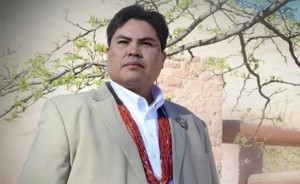Navajo lead fight to formally oppose ‘redskins’

Indian Country
TODAY MEDIA NETWORK.com
The Navajo Nation Council has adopted a bill opposing the use of the name ‘redskins’, a term that the United Nations Special Rapporteur on the Rights of Indigenous Peoples has called a “hurtful reminder of the long history of mistreatment of Native American people in the United States.”
The Navajo Nation Council voted 9-2 on April 10 on a bill called “Opposing the Use of Disparaging References to Native People in Professional Sports Franchises”.
“It was not easy but we finally got approval by the council and the Navajo Nation has finally joined the rest of Indian country in this fight,” councilman Joshua Lavar Butler said. “I think the actions of our council clearly show that [members] recognize the negative impacts such derogatory names cause for our people and also for Indian country. As for our people, I think it gives them confidence in how they approach society and makes them proud to be Navajo knowing that their central government and their trust council finally took a position on this controversial topic.”
The council’s statement of opposition also applies to “disparaging references” to American Indians in other professional sports franchises. But it does not apply to college or high school mascots. The mascot for at least one high school on the Navajo Nation is the Redskins.
Butler’s proposal was brought before the council in March, but it was tabled, because there were obstacles, including a generational challenge, he said. “The older generation may be desensitized to the negative impact of the racial slur. We did a lot of educating and answering their questions and so forth. It was a grassroots effort that helped us, as well – young people voicing their concerns to the council,” Butler said.
A lot of support came from young urban Navajo citizens living off the reservation, Butler said. “These are young Navajos working, going to school, being professionals – I received a lot of praise from that sector. They really applauded this effort and are very happy,” he said.
The Navajo Nation is believed to be the first Original Nation to formally adopt a resolution opposing the offensive name. Butler said his staff had researched the issue, working with the Nation’s Washington office and could find no tribal council acting on it, only national organizations or individual advocates. He recommends that other nations follow the Navajo council model. “I’ve offered the Navajo Nation’s approved resolution as a template to present before their councils and get a stamp of approval from their governments as well,” Butler said.
The day after the Navajo council vote U.N. Special Rapporteur on the Rights of Indigenous Peoples James Anaya called on Dan Snyder, the owner of the Washington Redskins Football team, to consider that the term “redskins” is a “hurtful reminder” of the historic mistreatment of Native Americans in the U.S.
“While I am aware that there are some divergent views on this issue,” Anaya said, “I urge the team owners to consider that the term ‘redskin’ for many is inextricably linked to a history of suffering and dispossession, and that it is understood to be a pejorative and disparaging term that fails to respect and honor the historical and cultural legacy of the Native Americans in the US.”
Anaya has written that “the use of stereotypes obscures understanding of the reality of Native Americans today and instead helps to keep alive racially discriminatory attitudes.” He said many stereotypes in the U.S. still portray Native Americans as relics of the past, perpetuated by the use of Indian names by professional and other high-profile sports teams, caricatures in the popular media and even mainstream education on history and social studies.


